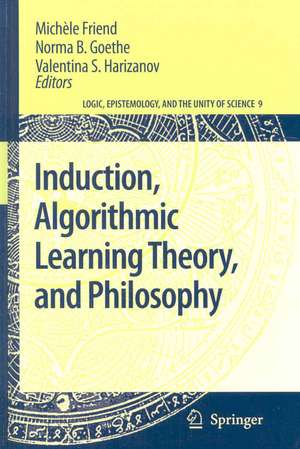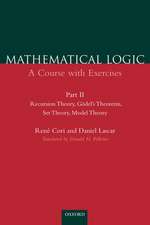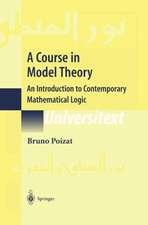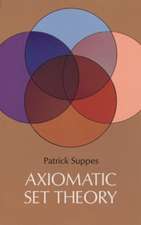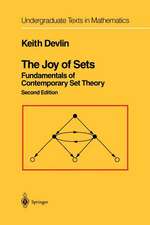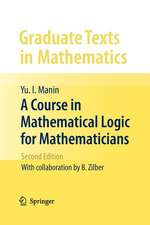Induction, Algorithmic Learning Theory, and Philosophy: Logic, Epistemology, and the Unity of Science, cartea 9
Editat de Michèle Friend, Norma B. Goethe, Valentina S. Harizanoven Limba Engleză Hardback – 28 aug 2007
| Toate formatele și edițiile | Preț | Express |
|---|---|---|
| Paperback (1) | 944.82 lei 6-8 săpt. | |
| SPRINGER NETHERLANDS – 25 noi 2010 | 944.82 lei 6-8 săpt. | |
| Hardback (1) | 950.96 lei 6-8 săpt. | |
| SPRINGER NETHERLANDS – 28 aug 2007 | 950.96 lei 6-8 săpt. |
Din seria Logic, Epistemology, and the Unity of Science
- 18%
 Preț: 1233.06 lei
Preț: 1233.06 lei - 18%
 Preț: 1001.32 lei
Preț: 1001.32 lei - 18%
 Preț: 1663.80 lei
Preț: 1663.80 lei - 18%
 Preț: 945.62 lei
Preț: 945.62 lei - 18%
 Preț: 1235.25 lei
Preț: 1235.25 lei - 18%
 Preț: 1224.06 lei
Preț: 1224.06 lei - 18%
 Preț: 955.70 lei
Preț: 955.70 lei - 15%
 Preț: 644.95 lei
Preț: 644.95 lei - 24%
 Preț: 1058.21 lei
Preț: 1058.21 lei - 20%
 Preț: 558.62 lei
Preț: 558.62 lei - 24%
 Preț: 878.91 lei
Preț: 878.91 lei - 18%
 Preț: 1236.99 lei
Preț: 1236.99 lei - 24%
 Preț: 896.28 lei
Preț: 896.28 lei - 24%
 Preț: 791.24 lei
Preț: 791.24 lei - 24%
 Preț: 727.48 lei
Preț: 727.48 lei - 24%
 Preț: 789.89 lei
Preț: 789.89 lei - 20%
 Preț: 561.67 lei
Preț: 561.67 lei - 20%
 Preț: 560.30 lei
Preț: 560.30 lei - 20%
 Preț: 568.73 lei
Preț: 568.73 lei - 24%
 Preț: 1046.20 lei
Preț: 1046.20 lei - 24%
 Preț: 698.16 lei
Preț: 698.16 lei - 20%
 Preț: 549.89 lei
Preț: 549.89 lei - 18%
 Preț: 958.73 lei
Preț: 958.73 lei - 20%
 Preț: 580.52 lei
Preț: 580.52 lei - 20%
 Preț: 550.76 lei
Preț: 550.76 lei
Preț: 950.96 lei
Preț vechi: 1159.71 lei
-18% Nou
Puncte Express: 1426
Preț estimativ în valută:
181.99€ • 188.00$ • 151.46£
181.99€ • 188.00$ • 151.46£
Carte tipărită la comandă
Livrare economică 25 martie-08 aprilie
Preluare comenzi: 021 569.72.76
Specificații
ISBN-13: 9781402061264
ISBN-10: 1402061269
Pagini: 304
Ilustrații: XIV, 290 p.
Dimensiuni: 155 x 235 x 30 mm
Greutate: 0.6 kg
Ediția:2007
Editura: SPRINGER NETHERLANDS
Colecția Springer
Seria Logic, Epistemology, and the Unity of Science
Locul publicării:Dordrecht, Netherlands
ISBN-10: 1402061269
Pagini: 304
Ilustrații: XIV, 290 p.
Dimensiuni: 155 x 235 x 30 mm
Greutate: 0.6 kg
Ediția:2007
Editura: SPRINGER NETHERLANDS
Colecția Springer
Seria Logic, Epistemology, and the Unity of Science
Locul publicării:Dordrecht, Netherlands
Public țintă
ResearchCuprins
to the Philosophy and Mathematics of Algorithmic Learning Theory.- to the Philosophy and Mathematics of Algorithmic Learning Theory.- Technical Papers.- Inductive Inference Systems for Learning Classes of Algorithmically Generated Sets and Structures.- Deduction, Induction, and beyond in Parametric Logic.- How Simplicity Helps You Find the Truth without Pointing at it.- Induction over the Continuum.- Philosophy Papers.- Logically Reliable Inductive Inference.- Some Philosophical Concerns about the Confidence in ‘Confident Learning’.- How to Do Things with an Infinite Regress.- Trade-Offs.- Two Ways of Thinking about Induction.- Between History and Logic.
Textul de pe ultima copertă
This is the first book to collect essays from philosophers, mathematicians and computer scientists working at the exciting interface of algorithmic learning theory and the epistemology of science and inductive inference. Readable, introductory essays provide engaging surveys of different, complementary, and mutually inspiring approaches to the topic, both from a philosophical and a mathematical viewpoint.
Building upon this base, subsequent papers present novel extensions of algorithmic learning theory as well as bold, new applications to traditional issues in epistemology and the philosophy of science. The volume is vital reading for students and researchers seeking a fresh, truth-directed approach to the philosophy of science and induction, epistemology, logic, and statistics.
Building upon this base, subsequent papers present novel extensions of algorithmic learning theory as well as bold, new applications to traditional issues in epistemology and the philosophy of science. The volume is vital reading for students and researchers seeking a fresh, truth-directed approach to the philosophy of science and induction, epistemology, logic, and statistics.
Caracteristici
Only book to combine philosophy essays with technical essays on algorithmic learning theory Invaluable for the reflective computer scientist or the mathematician/logician interested in modelling learning Deepens the argument and debate about mathematically modelling learning No-one with a serious interest in the philosophy of science can afford to ignore this development Refracts the classical problem of induction into a spectrum of new insights and questions
